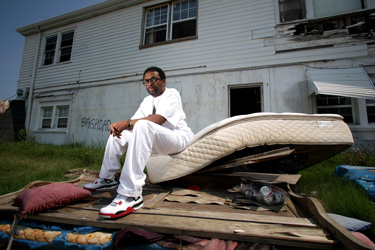Born 1957 in Atlanta, Georgia; lives in New York, New York
In the spring of 1986, a young American filmmaker presented his debut feature at the Cannes Film Festival: a low-budget, black-and-white production entitled She’s Gotta Have It. Set in the Fort Greene district of Brooklyn, a bohemian enclave of African- American sophisticates, it told of a graphic designer conflicted by the attention of three male suitors and her inability to commit to any of them. She’s Gotta Have It introduced a new voice to American film and announced the driving preoccupation of its twenty-nine-year-old writer-director, Spike Lee, with the divisive forces in contemporary life.
In each of his celebrated narrative films, Lee confronts various forms of antagonism head on: racial (Do the Right Thing [1989] ), sexual (She Hate Me [2004] ), or both (Jungle Fever [1991] ); creative (Mo’ Better Blues [1990] ); ideological (Malcolm X [1992] ); and fraternal (Get on the Bus [1996] ). His interest in dialectic oppositions is reflected in his artistic practice, which alternates between dramatic narrative and documentary, film and video, independent movies and studio productions, theatrical features and television programs. In 2006, Lee released one of his most commercially successful films, the lean, star-studded Hollywood heist thriller Inside Man, as well as one of the most acclaimed works of his career, an expansive television documentary on Hurricane Katrina broadcast on HBO. Sprawling, exhaustive, and furious, When the Levees Broke: A Requiem in Four Acts memorializes New Orleans before, during, and after the devastation wrought in 2005 by natural forces and human neglect. Using the spontaneous rhythms and associative leaps of jazz music, Lee orchestrates an immense amount of material (interviews, archival footage, photographs, news reports) over four hours of sustained intensity. Both a historically vital document and an emotionally overwhelming experience, When the Levees Broke is the culmination of Lee’s formal and ethical concerns—but only the beginning, hopes the filmmaker, of a proper reckoning with this great national tragedy. “One of the things I hope this documentary does is remind Americans that New Orleans is not over with,” Lee has said. “Americans have very, very short attention spans,” he continues. “And, I’ll admit there was eventually a thing called Katrina fatigue. But if you go to New Orleans, only one-fourth of the population is there. People are still not home. So hopefully this documentary will bring this fiasco, this travesty, back to the attention of the American people.” NATHAN LEE
Spike Lee, Spike Lee in the aftermath of Hurricane Katrina during the production of When the Levees Broke: A Requiem in Four Acts, 2006. Photo courtesy of Charlie Varley.
























